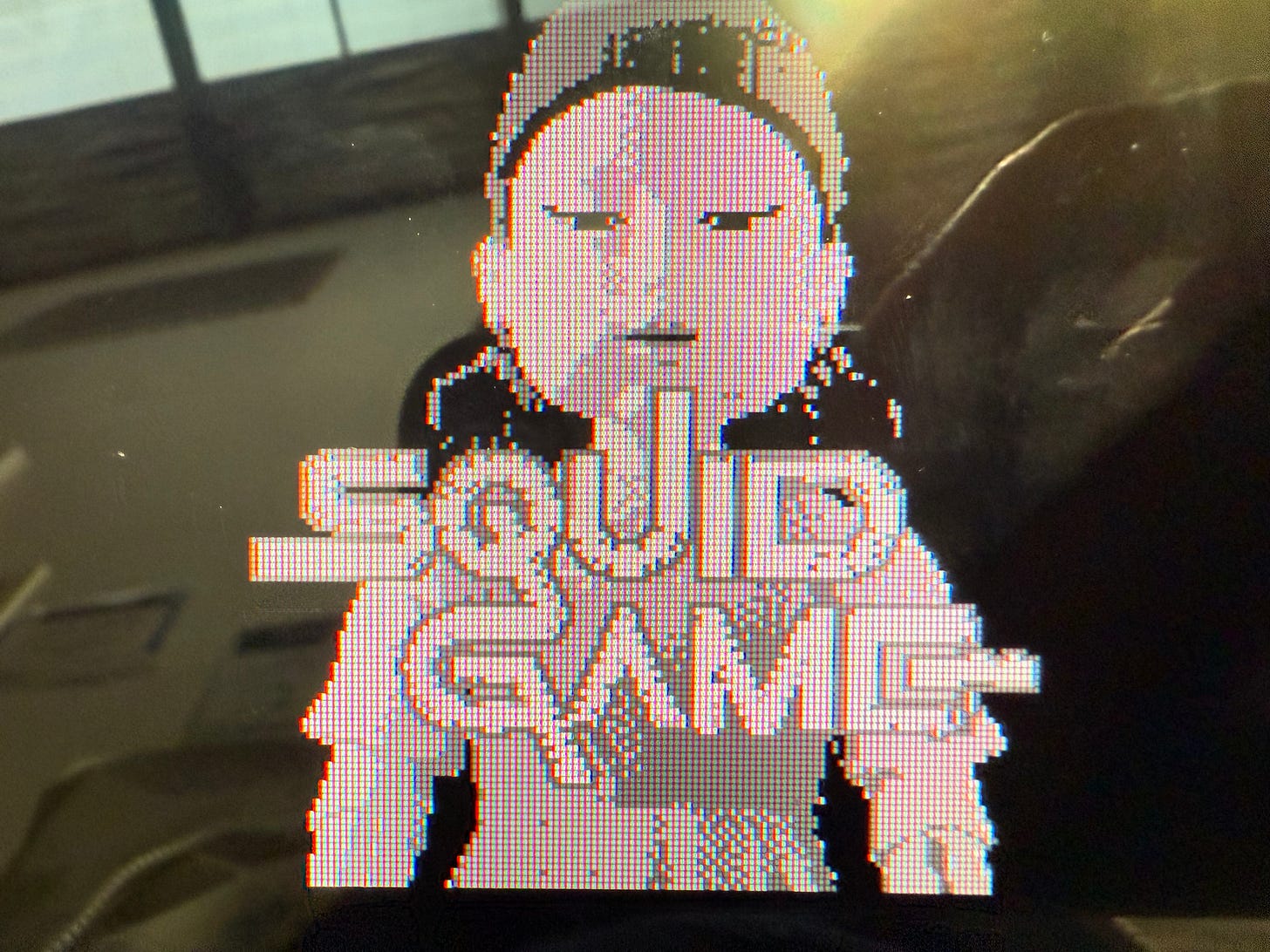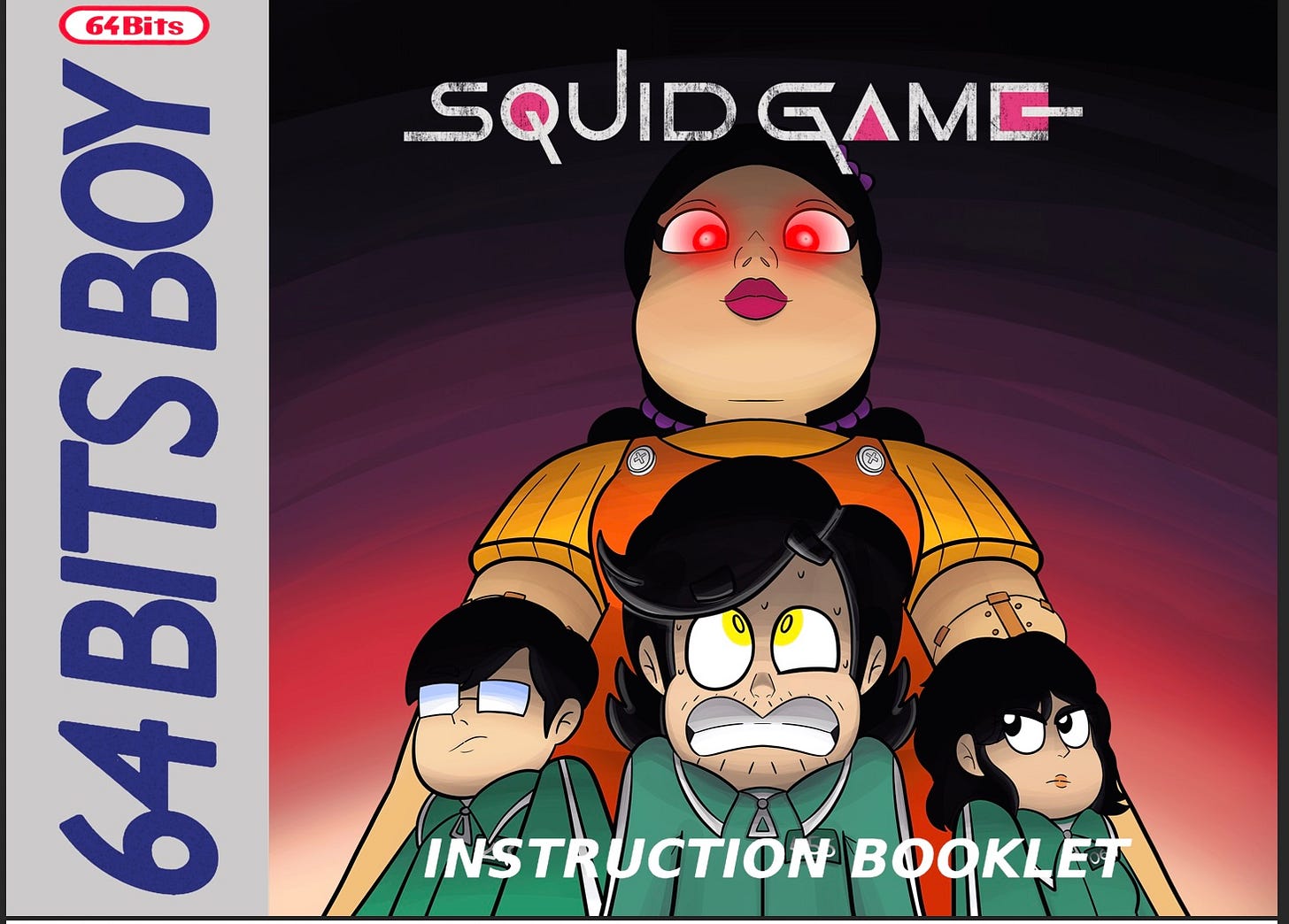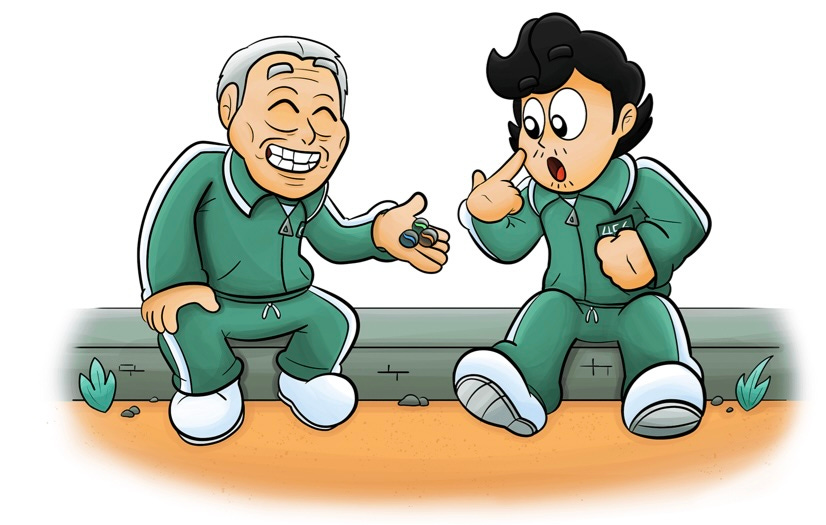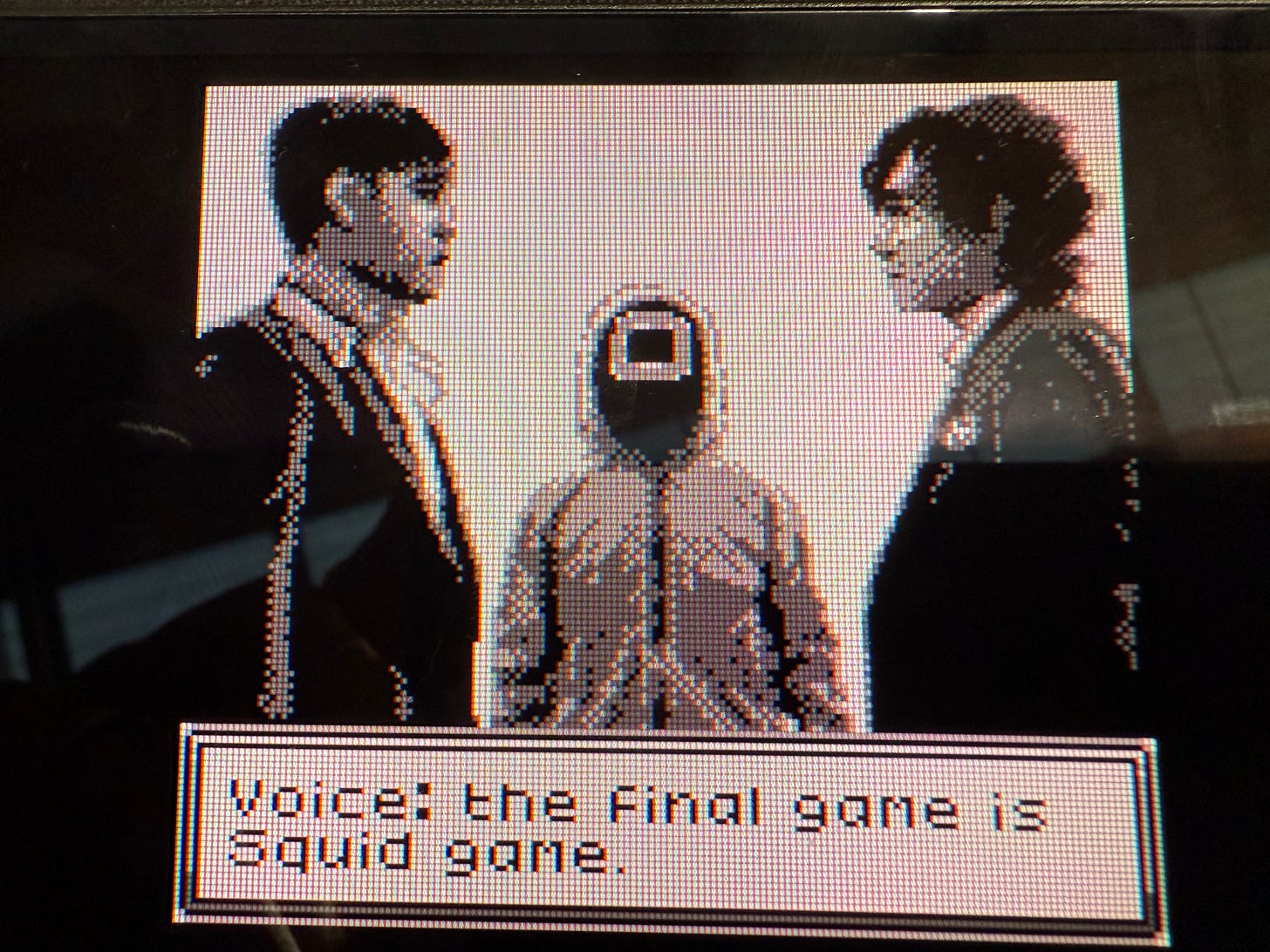Review: Squid Game on Game Boy
Can I survive this deadly fanmade demake? No. No, I can't.
There are many ways to die in Squid Game. I died in the dumbest way possible. I died because I told the truth. In this instance, honesty was not the best policy. It was a death sentence.
But I’m getting ahead of myself.
Squid Game is the brutal South Korean thriller series that follows a group of financially desperate contestants competing in deadly versions of children’s games in the hopes of winning a massive, life-changing cash prize. That’s what happens, but what it’s about is late-stage capitalism, the power structures that keep people trapped at the bottom and how human traits like greed, trust and moral character can be exploited by those with power and money.
But you don’t need to think too hard about that hard stuff to enjoy the show. It’s there if you want to tuck into it like it was a bowl of deep-fried calamari, but you can also just enjoy it as an unbearably intense slice of entertainment.
But, while watching the show, if you ever thought, ‘these kids’ games look like child’s play’, well, now you can put your virtual life on the line and see if you’re squiddy enough to survive these games.

Squid Game Boy is an unofficial, fan-made, indie demake for Nintendo’s humble Game Boy. It puts you in the green tracksuit of series protagonist Seong Gi-hun, aka number 456, and tasks you with surviving the events and games of the show’s breakthrough — and best — first season. A ‘demake’ simply means it’s a new game made for old systems.
Which brings us to my death.
I started Squid Game strong. Like the show, the first game is Red Light, Green Light. Racing to the finish line isn’t too tricky, as screeching to a halt when the giant girl statue turns is fairly forgiving. But it is unnervingly brutal to witness your fellow contestants get shot dead around you, and a bit sickening to negotiate all the fallen bodies littered on the ground as you near the finish line.
The second game is Sugar Honeycombs, a South Korean game where you have to dig an umbrella shape out of a biscuit with a needle while keeping the cookie from crumbling. The controls are wonky, I assume to simulate nerves, but it’s pretty easy to take the biscuit and progress.

Next, you have to survive the night as your fellow contestants attack you in an attempt to “cull the herd”. This is a simple platformer where you go from left to right and bounce on enemies’ heads to dispatch them before facing an end-of-level boss. The gameplay is short, sweet and very faithful to the classic Game Boy era gameplay.
You then move to the Tug of War. Fill a meter by mashing B, then when it’s maxxed out, press B in rhythm, and you’ll pull your rivals to their doom before moving on. Simple stuff.
Subscribing is also simple stuff. So do it!
After that is Odds and Evens. A game of chance, where you wager marbles guessing whether your opponent is hiding an odd or even number of marbles in his hand. Lose all your marbles and you lose the game. And your life.
Like in the show, you face the cheery old timer Oh Il-nam. He’s old and confused, and if you lose all your marbles, he’ll forget how many he was hiding, look you in the eyes and ask you a life-or-death question: “Was I odd or even?”
Remember those themes of greed, trust and moral character I talked about earlier? Well, here they are, jumping out at you like a cartoon mugger hiding behind a bush.
I pondered what to do for much longer than I should have. Before playing Odds and Evens, Squid Game Boy shows you the friendship between Gi-hin and Il-nam in gloriously succinct words and beautifully chunky digitised photos.
Il-nam and I were buddies, we were teammates, we were, in his words, gganbu — which is South Korean playground slang for ‘best friends’. And now, this happy old man was asking me the ultimate question.
It turns out I am an untrustworthy man of great greed who displays all the moral character of a secondhand car salesman insisting that the odd clunking noise coming from the rear tyre is a completely normal sound for a late 2000s Nissan Murano to be making.
You bet your life I lied about losing my bet. Il-nam didn’t blink. He handed me my ill-got winnings, and we continued playing the game. Again, I bet large. Again, I lost it all. Again, he forgot what he was hiding.
“Was I odd or even?”
I lied again.
“Was I odd or even?”
And again.
“Was I odd or even?”
And again.
It turns out I am absolutely crap at guessing how many marbles someone may be hiding in their closed fist. By this stage, I was agitated, frustrated and feeling surprisingly guilty for the waterfall of lies gushing out of my mouth.
If Odds and Evens is a mind game, then after about 15 minutes of this repetitive, endless loop, I had descended into madness. No matter what I did or how strategic I got, I simply couldn’t win the game. I bet large. I bet little. I bet in between. And I lost and lost and lost.
“Was I odd or even?”
Truly, the game got inside my head. I was losing it. But then I realised that 64 Bits had done something utterly genius. They’d made this ridiculously simple game of chance into an actual, real test of the player’s greed, trust and moral character.
Odds and Even, I now understood with perfect clarity, was purposefully unwinnable. No matter what, you would always lose. And then you’d always be asked the same question. The only path to victory was to pass the test of character. Otherwise, you’d be damned for eternity in this crazed, endless loop.
Smiling, Il-nam asked me, “Was I odd or even?”
Smiling, I answered him truthfully.
Smiling, I was instantly shot dead.
Thus, my first attempt to win Squid Game came to a frustrating, bloody and very final end. As in the show, there are no second chances.
Yes, I rage quit. I rage quit hard. But I’ve since gone back and won. Surprisingly, I beat Il-nam in just two turns, going all in and guessing correctly both times. He got shot, and I breezed through the next two mini games to secure the victory, the money and my still alive status. I barely gave a second thought to my fallen gganbu.
Share this with your Squid Game-loving pals. And your Squid Game-hating pals!
If you’re a fan of Squid Game and a retro gamer, then Squid Game Boy is a must-play. No, its six mini-games aren’t all that challenging, and they aren’t particularly replayable, but it’s a cool little game that perfectly encapsulates the show and successfully imagines what a licensed game would have looked like back in the day.
The game is short; if all goes your way, you’ll beat it quicker than it took to read this article, but extra replayability is squeezed out by collecting all three endings and hunting down all the Retro Achievements.
And while the actual Squid Game may carry the ultimate price, Squid Game Boy is completely free. Making it even more of a no-brainer to have a bash on. The ROM is playable on Game Boy emulators, in your browser or even on original Nintendo hardware if you have a flash cart. Pretty damn cool.
From what I can tell, 64 Bits is primarily a games-focused animation channel. So, considering they’re not game devs, what they’ve achieved here is remarkable. The expressive brevity of Squid Game Boy’s storytelling, coupled with those digitised photos, not only captures the essence of the show perfectly but also fires up all those nostalgia neurons collecting dust in your brain.
The graphics are perfect, and the gameplay, while simple, does feel exactly like a licensed game of the Game Boy era. I can think of no higher praise than that.
Squid Game Boy is deadly fun, even if it is unlikely to keep your interest alive after you’ve beaten it.
Download Squid Game Boy here: https://64bitsanimation.itch.io/squid-game-boy
Be our gganbu and subscribe!
More Games:






